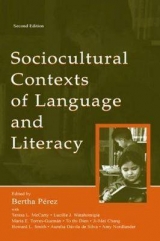
Sociocultural Contexts of Language and Literacy
Lawrence Erlbaum Associates Inc (Verlag)
978-0-8058-2257-1 (ISBN)
- Titel erscheint in neuer Auflage
- Artikel merken
Sociocultural Contexts of Language and Literacy engages prospective and in-service teachers in acquiring knowledge and understanding of linguistically and culturally diverse students, their experiences, and their sociocultural backgrounds--and in using this knowledge to enrich literacy learning in classrooms and communities. The text is grounded in a sociocultural perspective and a constructivist approach, which are used to provide a framework for making school literacy accessible to diverse students.
Part I: "Theoretical Perspectives on Language and Literacy" provides a foundation for understanding first- and second-language literacy development or literacy in bilingual settings, including discussion of new perspectives on literacy, the role of text and context, and, above all, the role of sociocultural experience in creating meaning. Readers are challenged to investigate schools, programs, and public policies and the effects that these have on the education of linguistically and culturally diverse students.
Part II: "Language and Literacy Acquisition in Diverse Communities," reviews research studies and offers information about literacy learning in six different sociocultural contexts: Native American, Puerto Rican, Chinese, Vietnamese, African American, and Mexican American. Part I and Part II together form a framework for teachers to analyze, understand, and accommodate the multiple social, intellectual, cultural, and language differences that children bring to the classroom.
Part III: "Literacy Development in Multilingual, Multicultural Classrooms," focuses on instructional practices and the key roles teachers play in facilitating or thwarting literacy development; alternative collaborative practices are suggested. The reader is guided to evaluate literacy curriculum frameworks within the specific cultural and linguistic knowledge presented in Part II. Processes for adapting and developing literacy curricula for multicultural and multilingual contexts are recommended. A sociocultural constructivist framework for developing literacy curricula that focuses on collaborative theme-based inquiry within a community setting is illustrated. Assessment processes are examined for their cultural and linguistic appropriateness.
Activities and Suggested Readings at the end of each chapter encourage readers to "make meaning," observe, reflect, and construct application processes based on new understandings gained from this text.
The focus in this book on English literacy development does not imply advocacy for "English only" or even English as a second language as the primary mode of instruction. Rather, the position taken is that learners need to develop literacy in their native language, and that the concepts and skills thus learned create a foundation of strength for developing English-language literacy.
Contents: Preface. Part I: Theoretical Perspectives on Language and Literacy. B. Pérez, Literacy, Diversity, and Programmatic Responses. B. Pérez, Language, Literacy, and Biliteracy. B. Pérez, Writing Across Writing Systems. Part II: Language and Literacy Acquisition in Diverse Communities. T.L. McCarty, L.J. Watahomigie, Language and Literacy in American Indian and Alaska Native Communities. M.E. Torres-Guzmán, Language, Culture, and Literacy in Puerto Rican Communities. T.T. Dien, Language and Literacy in Vietnamese American Communities. J-M. Chang, Language and Literacy in Chinese American Communities. H.L. Smith, Literacy and Instruction in African American Communities: Shall We Overcome? A. Dávila de Silva, Emergent Spanish Writing of a Second Grader in a Whole-Language Classroom. Part III: Literacy Development in Multilingual, Multicultural Classrooms. B. Pérez,A. Norlander, Making Decisions About Literacy Instructional Practices. B. Pérez, Creating a Classroom Community for Literacy. B. Pérez, Literacy Curriculum and Language Diversity.
| Erscheint lt. Verlag | 18.7.2007 |
|---|---|
| Verlagsort | Mahwah |
| Sprache | englisch |
| Maße | 152 x 229 mm |
| Themenwelt | Geisteswissenschaften ► Sprach- / Literaturwissenschaft ► Anglistik / Amerikanistik |
| Geisteswissenschaften ► Sprach- / Literaturwissenschaft ► Sprachwissenschaft | |
| Sozialwissenschaften ► Pädagogik | |
| ISBN-10 | 0-8058-2257-7 / 0805822577 |
| ISBN-13 | 978-0-8058-2257-1 / 9780805822571 |
| Zustand | Neuware |
| Informationen gemäß Produktsicherheitsverordnung (GPSR) | |
| Haben Sie eine Frage zum Produkt? |
aus dem Bereich



